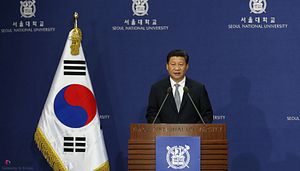The China-Republic of Korea (ROK) relationship is at its “best in history” since President Xi Jinping and President Park Geun-hye assumed office. China’s diplomacy reflects this: Chinese President Xi Jinping’s visit to Seoul was uncharacteristically a single-country trip. Obviously, South Korea is an important East Asian country, and has a very important role in China’s relations with its neighboring countries.
The economic cooperation between these two countries has been truly miraculous. In 1992, the total trade volume between China and South Korea was merely $6 billion. That number has skyrocketed to over $270 billion 2013, which is more than the value of ROK-Japan and ROK-U.S. trade combined. Further, the China-ROK political relationship has transcended bilateral ties, as both maintain a substantial level of communication and cooperation in regional multilateral affairs.
What’s more, China seems to have launched a new charm offensive toward South Korea. China constructed the Ahn Jung-geun Memorial in Harbin, memorializing the Korean responsible for the death of Ito Hirobumi. China has also built a Korean Liberation Army Memorial in Xi’an with plans for another in Chongqing. Then there was an advertisement in China Youth Daily favoring South Korea’s claim in the naming dispute over the sea between South Korea and Japan. At every turn, China is offering support to South Korea, especially on issues involving Japan’s imperial history.
In his speech delivered at Seoul National University in South Korea, President Xi suggested “jointly forging a community of shared interests.” In fact, China and South Korea are already forging a genuine community of economic and security interests, which is very necessary for both countries economically and politically. First, South Korea’s economy has been increasingly relying on China’s huge domestic market and China’s enormous human resources. For example, Samsung’s recent decision to invest over $7 billion in Xi’an to construct a strategic research and development base symbolizes South Korea’s determination and confidence in economic cooperation with China. Secondly, a number of regional multilateral economic, political, and security issues have compelled both China and South Korea to keep up frequent communication and cooperation. The two countries have common interests or share similar positions on a number of regional issues, such as the peace and stability of the Korean Peninsula, regional denuclearization, and historical issues in relation to Japan’s past imperialist invasions. What’s more, historical and cultural intimacy may help to solidify the close ties between Beijing and Seoul, although there are still differences.
As China has decided to strive for “a sound neighboring environment,” Xi’s state visit to Seoul indicates that South Korea has an important role in China’s diplomatic work in neighboring countries. China may have decided to forge the China-ROK relationship into a successful model for China’s relations with its neighboring countries. However, as a strategically important ally in East Asia, South Korea’s close ties with the U.S. are undoubtedly a factor in the China-ROK relationship. The ROK-Japan relationship has been the weakest link in the U.S.-ROK-Japan triangle, so China’s decision to give substantial attention to South Korea is a strategic move for Beijing.
The China-ROK “community of shared interests” doesn’t directly challenge the ROK-U.S. “comprehensive strategic alliance” based on “shared values.” Still, China’s new charm offensive is the cause of some concern in the U.S., even though Washington agrees that China-ROK political trust and cooperation are indeed necessary for peace and development in the region. Therefore, how the China-ROK “community of shared interests” coexists with the ROK-U.S. “alliance of shared values” will be a complicated, crucially important, and strategically significant long-term issue for multiple parties.
The idea of a China-ROK “community of shared interests” is new, while the ROK-U.S. alliance has a history of more than six decades and has been firmly constructed on the basis of “shared values of liberty, democracy, and a market economy.” While China may have an advantage in economic ties, the political and military trust between South Korea and the U.S. obviously exceeds that between Seoul and Beijing. Even though there have been ups and downs, South Koreans mostly regard the U.S. as their most important ally. For the China-ROK “community of shared interests” to succeed and have a lasting importance, China and South Korea will need to transcend shared “interests” to construct common views, beliefs, and even values on the basis of “seeking common ground while reserving differences.” As the recent charm offensive has shown, this will be an important long-term project for the Chinese leadership.































